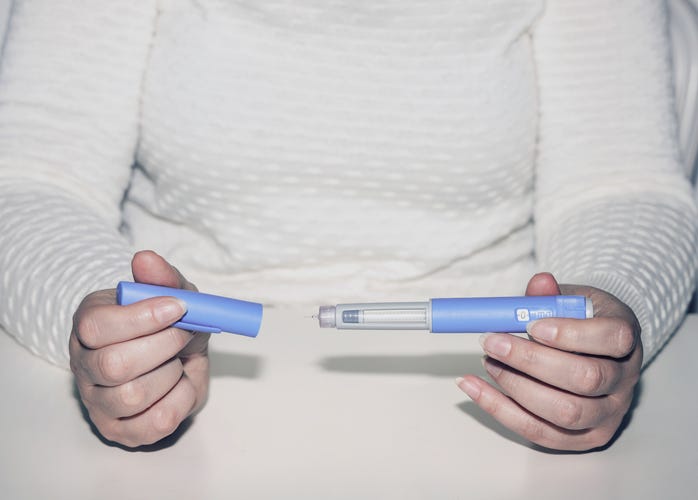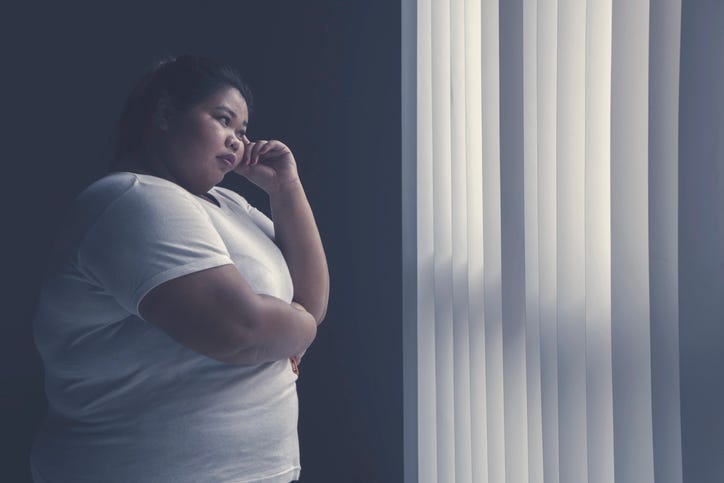Do We Need Another Thin Person's Ozempic Take?
Design Mom's "expansive thoughts" don't come in my size.
Hi there! Burnt Toast is still on our summer break, so here’s a rerun of a piece I published in June. It was a popular one, so I decided to take it out from behind the paywall—something I do occasionally as a thank you to everyone on the free list who still supports our work in so many ways. Of course, if you find this piece valuable, I’d love you to join us as a paid subscriber, too! You’ll get behind every paywall here and you can join us in the comments, too.
In May, author and influencer Gabrielle Blair wrote an essay called “My expansive thoughts on Ozempic, a drug I have never taken.” Last week, she published some follow-up thoughts. Many of you have asked me to write about this, and at first, I’ll admit, I didn’t want to go there. I have long respected Blair as a writer, designer, parent, and content creator. Her work is always aspirational and makes me want to move to Northern California or Normandy, France, but also straightforward and honest. She has written thoughtfully about so many hard topics — depression, gun violence, and abortion, to name a few. And on Design Mom, she hosts one of the few Internet communities able to hold those conversations and welcome a multitude of perspectives without it turning ugly, immediately. As a Mormon mother of six, she can often invite conservatives into conversations in ways that challenge everyone to think harder, and do better.
But Blair’s piece on Ozempic did not do any of that. And we’ll talk about why, but first I want to say that I’m not writing this response piece as an attack. I’m writing this with the hope of inviting Blair—but more broadly, the thousands of folks who share her perspective—into a conversation in a way that will challenge us all to think harder and do better—in this case, on behalf of fat people. The ideas she sets forth are ones I see taking hold across the GLP-1 discourse. And they have significant potential to harm fat folks.
So let’s have a hard conversation about Blair’s Ozempic essay.
I’ll start by naming our common ground. Blair is absolutely right that we need less shame and stigma around the idea of daily lifelong medications when so many of us rely on those to manage mental and physical health conditions. In an apocalypse scenario, I’m only going to make it until my inhaler runs out and that’s assuming I haven’t lost my glasses or my allergy medicine first. I also agree with Blair about the cruelty of the widespread judgment that folks losing weight on GLP-1s are somehow “taking the easy way out.” There is no easy way to have a body in this world, and there is for sure no easy way to have a fat body in a world that tells us every day that’s our biggest problem to solve.
And, I appreciate that Blair names the twin harms of fatphobia and diet culture in both pieces. But I wish she had reckoned more directly with her own privilege as a straight-sized person, and her own anti-fat bias, both of which are threaded throughout these pieces.
After describing a post-Ozempic world without snacking (no cookies at PTA meetings, no pretzels on plane rides!), Blair writes:
We can’t accurately picture what a world would be like if patriarchy didn’t exist. And I don’t think we can picture what a world would look like without our cultural obsession with thinness and fatphobia; we can’t comprehend a world where weight-loss culture doesn’t exist.
But here’s the thing: Widespread use of GLP-1s won’t eradicate weight loss culture, or our obsession with thinness. Widespread use of GLP-1s for weight loss is weight loss culture. It is a direct manifestation of our obsession with thinness. It is fatphobia in action.
Blair tries to solve for this by envisioning some rosy future in which science is able to resolve all side effects, and governments can bring the costs of these drugs down, so these medications become more accessible than they are right now. We’ll set aside how impossible this fantasy is, given the realities of the US healthcare system. We also have to ignore—as Blair did—the fact that not everyone experiences GLP-1s in the same way. Not everyone stops experiencing hunger or food noise; not everyone loses weight on GLP-1s, and not everyone loses the amount of weight that would move them from fat to thin. Nevertheless! For the purposes of this thought experiment, Blair is careful to emphasize “no one would be forced to use these drugs.” But this ignores the price that anyone who abstained would be paying to opt out.
Fat people are already told daily, in a thousand big and small ways, that we’re failing because we aren’t thin. If thinness becomes “more accessible,” anyone choosing not to change their bodies would be even more ostracized than we already are. It wouldn’t matter if people were opting out because the medication still wasn’t accessible to them, or because they know that experiences of weight loss trigger their body dysmorphia or eating disorders or because they just like how they look and feel fat better than how they look or feel thin. A world of widespread, drug-supported, thinness doesn’t eradicate anti-fat bias because the goal of that world is to eradicate fat people.
Our experiences of anti-fatness complicate all of our relationships to food, to clothing, to healthcare providers, and to showing up in the world. Blair’s motivation for writing this piece is a conversation she has with a reader who describes her experience on GLP-1s as an increase in brain capacity:
[...] all this brain space, brain power, brain capacity has been opened because she’s not thinking about food or weight-loss or body image. To be clear, she’s keeping up her already good habits — nutrition, weightlifting, activity, etc.. But even with the upkeep, her brain is far more free and available than it felt a few weeks ago. Until taking this drug, she didn’t understand how much of her brain’s resources were dedicated to food and diet — what she’s going to eat next, food to avoid, having a craving, feeling guilty about eating too much, or proud for avoiding a snack, wondering if she’ll fit into an outfit, worried the doctor will bring up weight instead of addressing a medical problem, worried she’s taking up too much space in the world.
I’m glad this woman is having a good experience with her medication and noticing all of these positive changes in her life. Her body belongs to her and I am not here to question her decision to lose weight, or to police any individual’s choices about their bodies. But let’s be very clear: It wasn’t this person’s fatness — as in, the literal pounds on her body— that made her think constantly about food, or worry about clothes fitting, or how she would be treated at the doctor’s office. It was her experience of anti-fat bias. She worried she was taking up too much space in the world because the world told her this, constantly. And that’s what convinces us we need to try every diet or feel guilty about eating too much. Anti-fat bias is why the clothes don’t fit; because clothing manufacturers don’t design clothes with all bodies in mind. Anti-fat bias is why her doctor brought up weight instead of addressing a medical problem. Anti-fat bias is behind all of it.
I don’t blame this person—or any of us— for wanting to experience a less biased version of the world. Perpetual marginalization is an exhausting way to live and creates real barriers. Fat folks have to worry about fitting into seats in restaurants and at hair salons, the dentist, and in every waiting room ever. Fat women are paid less on average than our thin counterparts. We are objectified and dehumanized by the media. And it’s much harder for us to access life-saving and sustaining medical care.
But to add a layer to Blair’s thought experiment: Imagine a world where permanently changing the color of your skin became safe and affordable for everyone; government-sponsored even. Would the ability to (safely! affordably!) change your skin color solve racism?
Of course not. It’s a horrifying premise because all we would do is erase the beauty of human diversity. Even if no one was forced to do it—if we were simply making whiteness more available and accessible—the communities that opted out would be even more marginalized and stigmatized than they are now. We don’t solve bias by eradicating the people we are biased against.
Racism and anti-fatness do not cause the same level of harm. It’s essential that we understand anti-fatness as originating in racism, specifically anti-Black racism, but hold that together with the fact that a white, fat person’s experience of the world will always be different from a person of color’s. But I’m adding this question to Blair’s philosophical musings because drawing a parallel between race and fatness can help folks new to the anti-fatness conversation understand we are not talking about whether we love our bodies enough or how to be more body positive. We are discussing a form of systemic bias, which intersects with many other, even more harmful and entrenched, forms of bias. You can insert gender, sexuality and disability into this scenario as well, and see how fast we end up in a dystopia.
Fatness has not historically been identified as a marginalization, so anti-fatness has long gone unnamed in conversations about weight. But one of the few things that mainstream obesity researchers and fat activists and writers like myself can agree on right now is that our weight is far more of a fixed trait than diet culture has claimed. Body size is influenced by lifestyle habits, but far more by genetics, biology and social determinants of health that are beyond our direct control. Losing weight has never been about willpower. And we did irreparable damage to fat people by selling them the myth of “try harder” for so long.
Indeed, the food noise that GLP-1s are so celebrated for silencing is, as
has argued, very often caused by diet culture and the “just try harder” myth. But that means we need a radical reframing of how we think about food and bodies, not a more surefire way to turn a fixed trait into a mutable one. We aren’t going to solve diet culture by making everyone thin because losing weight does not solve the widespread discrimination that fat folks face. It just makes it a little harder to detect—especially if you’ve never been fat.






"Imagine a world where permanently changing the color of your skin became safe and affordable for everyone; government-sponsored even. Would the ability to (safely! affordably!) change your skin color solve racism?
"Body size is influenced by lifestyle habits, but far more by genetics, biology and social determinants of health that are beyond our direct control.
"I’m adding this question to Blair’s philosophical musings because drawing a parallel between race and fatness can help folks new to the anti-fatness conversation understand we are not talking about whether we love our bodies enough or how to be more body positive. We are discussing a form of systemic bias, which intersects with many other, even more harmful and entrenched, forms of bias."
I pull these quotes to emphasize my discomfort with equating fat with race. Body size is influenced by lifestyle and social determinants of health as well as genetics. Those first two components are not a part of the race equation. I ask, therefore, that we are mindful when making the comparison. There are only two things that I absolutely cannot alter. I must stay black and die. The same is not true for absolutely every fat body.
I haven't read the second Blair article yet but as a fat person on Ozempic for type 2 diabetes I'd prefer that thin people not on GLP's stop thinsplaining it.
As Virginia and many others have said, it's not a magic bullet to societally approved levels of thinness, nor does it give people freedom from thinking about food/wanting to eat/etc. People have very different responses to it. I worry that it will actually increase anti-fat bias if people think that anyone who wants to lose weight can and should do so with GLPs.
Ozempic has worked wonders for my blood sugar and I am back at my adult setpoint weight (hint - I am still fat) but some of the brain space previously devoted to food is now devoted to working extra hard to manage my ADHD, because my ADHD meds absorb a lot more slowly and stuff takes longer. Since everything takes longer, I have less time or willpower for exercise, which makes my ADHD worse too. So it's sort of a wash in terms of mental noise.
To be honest, the biggest driver in reducing my "food noise", which I define as time spent thinking about food when I don't want to be thinking about food, is not Ozempic or therapy or ADHD meds or having my blood sugar under control. It's not having to cook or shop for anyone other than myself.